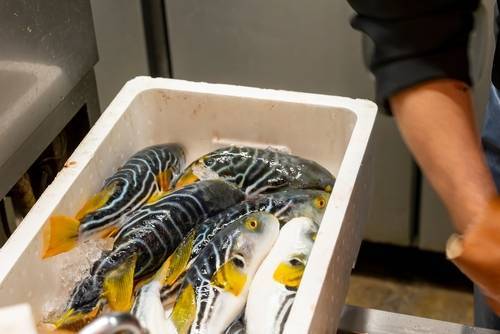The recent death of an elderly couple from pufferfish poisoning in Malaysia has raised concerns about the need for stronger laws to prevent similar incidents from happening in the future.
Ng Chuan Sing and his wife Lim Siew Guan, both in their early 80s, unknowingly purchased at least two pufferfish from an online vendor on March 25. Lim fried the fish for lunch, and the couple began experiencing breathing difficulties and shivers after eating it. Medical professionals rushed the elderly couple to the hospital. There, Lim passed away on the same day. Subsequently, Ng fell into a coma for eight days before ultimately passing away.
Pufferfish Poisoning
Certain species of pufferfish contain toxins that cause pufferfish poisoning, also known as fugu poisoning, when ingested. These toxins include tetrodotoxin and saxitoxin, which are potent neurotoxins that affect the central nervous system. Ingestion can cause rapid onset of symptoms such as tingling around the mouth and dizziness. Convulsions, respiratory paralysis, and death may follow. There is no known antidote to these toxins.
Prevalence of Pufferfish Poisoning in Malaysia
Pufferfish poisoning is a significant public health concern in Malaysia, with at least 58 poisoning incidents involving pufferfish consumption and 18 deaths reported in the country between 1985 and 2023, according to the Malaysian health ministry.
Many Malaysian wet markets still sell poisonous pufferfish, despite laws prohibiting the sale of such harmful food. “It’s considered exotic and tends to attract consumers” says Aileen Tan. Tan is a marine biologist and director at the Universiti Sains Malaysia Centre for Marine and Coastal Studies.
The Need for Stronger Laws and Public Awareness
Ng Ai Lee, the couple’s daughter, has called for stronger laws and public awareness campaigns to prevent future incidents of pufferfish poisoning. Malaysian law prohibits the sale of poisonous and harmful food like pufferfish meat. The offense carries a fine of RM10,000 ($2,300) or a prison term of up to two years. However, more needs to be done to ensure that these laws are enforced and that the public is aware of the risks associated with consuming pufferfish.
“Those responsible for their deaths should be held accountable under the law, and I hope the authorities will speed up investigations,” Ng said. “I also hope the Malaysian government will beef up enforcement and help to raise public awareness on pufferfish poisoning to prevent such incidents from happening again.”
Certification of Vendors and Suppliers
According to Aileen Tan, there needs to be more awareness about the risks of consuming pufferfish. Additionally, authorities need to look at special certifications for vendors and suppliers. Tan warns that once vendors clean and sell pufferfish as slices, it becomes nearly impossible for the public to know the type of fish they have purchased. “As for sellers, it is debatable on their (part) if they are aware (of the risks).”
The Japanese Example
Japan has some of the strictest regulations in the world governing the preparation and consumption of pufferfish. Japan requires fugu chefs to undergo extensive apprenticeships of up to three years. They subsequently get their license and allows them to handle and prepare the fish for food. According to its health ministry, incorrectly preparing fugu is one of the most frequent causes of food poisoning in Japan.
Conclusion
The recent deaths of an elderly couple from pufferfish poisoning in Malaysia highlight the need for stronger laws and public awareness campaigns to prevent future incidents of pufferfish poisoning. Authorities in Malaysia need to do more to enforce the laws prohibiting the sale of poisonous and harmful food like pufferfish meat. They will also need to ensure that the public is aware of the risks associated with consuming such product. Special certifications for vendors and suppliers, as well as extensive training for those who prepare pufferfish, may be necessary to prevent future incidents.
As a highly prized but deadly delicacy, pufferfish must be handled with great care to prevent poisoning. People enjoy pufferfish as a highly-priced delicacy in countries like Japan, South Korea, and Singapore, but it requires correct preparation to avoid serious health consequences. The recent deaths in Malaysia serve as a tragic reminder of the dangers associated with pufferfish consumption. Consequently, it emphasises the need for stricter regulations to prevent such incidents from happening in the future.

